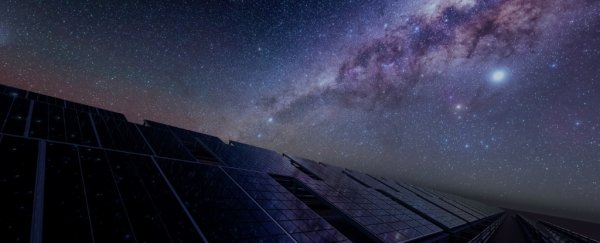Scientists are ironing out the kinks for an 'anti-solar power' cell, one that can harvest energy at nighttime, even when the sun isn't shining.
Instead of absorbing light from the Sun and converting it into electricity, like a normal solar panel would, this type of technology works in reverse.
At night, when there's no incoming heat for solar panels to capture, there's still outgoing heat we can make use of. By pointing a warm panel up towards the cold sink of space, this heat begins to radiate outwards as invisible infrared light.
This is known as radiative cooling, and if that outgoing heat can somehow be harnessed, it could cheaply light our cities at night. Storing solar power during the day is a relatively expensive proposition, so directly producing some nighttime power could help to reduce that load.
Using a thermodynamic model of a thermoelectric power generator, scientists from Stanford University have now worked out a rooftop proof-of-concept that could theoretically generate 2.2 watts per square meter without the need for a battery or an external energy source
While others have attempted similar nighttime cells, this particular design could produce 120 times more energy. In fact, it's nearly on par with the performance of a Carnot heat engine, which is a theoretical thermodynamic limit for the "perfect" engine.
"This result is significantly higher than the previous reported results and points to the potential applicability of harvesting electrical power at night," the authors write.
 (Lingling et al., Optics Express, 2020)
(Lingling et al., Optics Express, 2020)
The concept is based on existing technology that combines and optimises radiative cooling with a thermoelectric power generator - one that takes up less than 1 percent of the whole device's footprint, which is a good sign for scalability, as the thermoelectric power generator is the most expensive part of the system.
Using computer models based on real-life parameters, the authors put their optimised simulation to the test. Placed on a rooftop, they claim the size of their cell creates the best balance between heat loss and thermoelectric conversion.
"We are working to develop high-performance, sustainable lighting generation that can provide everyone - including those in developing and rural areas - access to reliable and sustainable low cost lighting energy sources," says electrical engineer Lingling Fan from Stanford University.
"A modular energy source could also power off-grid sensors used in a variety of applications and be used to convert waste heat from automobiles into usable power."
Of course, those practical applications are yet to be realised. The authors admit that while their demonstration of nighttime electrical power generation is "remarkable", it's still not enough to fulfil many of the desires mentioned above; still, a technology that doesn't rely on the burning of fossil fuels for our energy needs is worth exploring.
The study was published in Optics Express.
